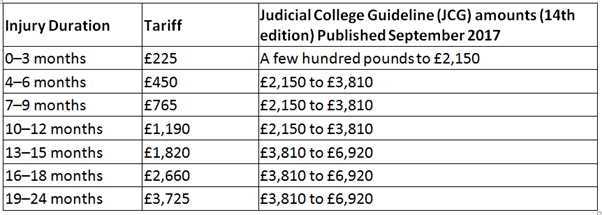We’ve all had that call from a claims management company, telling us that we’ve had a car accident within the last three years and that we ought to make an injury compensation claim (despite our best endeavours to tell them that we haven’t been involved in an accident, ever!)
We dislike these types of marketing companies that cold call for personal injury claims, just as much as the next person does.
Yet, whatever their merits (there aren’t any), one question that you might have asked yourself after listening to their call, is……
Why do they always refer to an ‘accident within the last 3 years’?
Some people will know the answer to that question, but for those who don’t, it refers to something called the ‘limitation period’.
Without getting into speaking legalese, it simply means that if you have suffered personal injury in an accident that was caused by another person, then as an adult, you have just 3 years from the date of the accident within which to start a claim against the person that caused it (in reality, against their insurer).
The rule that there’s a period of 3 years within which to start a personal injury claim is set out in the act of Parliament called the Limitation Act 1980.
If for example, you don’t start a whiplash claim, within three years from the date of the accident, you won’t be able to claim at all. Your claim will be ‘time-barred’ or ‘statute barred’. In other words, it will be dead in the water.
By, ‘to start a claim’, we mean that the court process must have been commenced. It’s not enough that you have been in correspondence with the other party’s insurance company. If the claim hasn’t been settled, papers must have been sent to the county court for ‘issuing,’ i.e., you must have paid your court fee and got your court papers stamped, at the very least.
Why do some people who have suffered personal injury in a road traffic accident not make a whiplash claim straightaway?
There may be any number of reasons. Here are some of them:
- They don’t realise that they are entitled to claim
- They are aware that they can claim but want to wait and see how their whiplash injury develops before deciding whether to make a claim
- They are aware that they can claim and also know that they have three years within which to do so. For that reason, they put off claiming until they have ‘got the time’ to get in touch with a solicitor.
- They know that they can claim for the personal injury that they have suffered but haven’t made a claim before and are a bit nervous about doing so now.
It has always made sense to take legal advice as soon as possible from an expert personal injury solicitor when you’ve suffered a whiplash injury in a road traffic accident:
- The circumstances surrounding the accident are still fresh in your mind. Just as importantly, they are still fresh in the minds of any possible witnesses.
- Talking to an experienced personal injury soon after the accident will help take some of the strain of the accident from off your shoulders.
Being involved in a car accident is not a pleasant experience, even if you have not been seriously injured. In any event, let’s not minimise whiplash – chronic whiplash is highly painful and debilitating. If you speak to a solicitor who’s an expert in the field of road traffic accident claims, they will provide you with sound advice about the next steps to take and reassure you on anything that is worrying you.
- A whiplash injury solicitor may be able to arrange for you to start receiving physiotherapy or other rehabilitation treatment at an early stage, to help you to recover more quickly from your injuries.
- All personal injury claims, even fairly straightforward ones, can take time to get settled, or brought to a conclusion through court proceedings. It’s better to get your claim underway early on, rather than rushing round to sort it out close to the limitation period.
- If you only start a whiplash claim some years after the accident happened, it does tend to make the insurance company on the other side rather defensive and suspicious about how genuine your injury claim is. It can lead to them defending the claim or raising arguments about ‘fundamental dishonesty’ even in claims where there is a genuine injury. This only serves to make the claim drawn out and perhaps even challenged in court.
The Whiplash Reforms are coming – we think!
There’s now another reason for getting a whiplash claim started as soon as possible after the accident that was the cause of it.
The Government’s Ministry of Justice (MoJ) is intent on pushing through its Whiplash Reforms Programme which has its basis in the act of Parliament called the Civil Liability Act 2018.
The ‘reforms’ were originally meant to happen in April 2019. Then they were postponed to April 2020. Then they went to August 2020. Now they will be implemented in April 2021.
We have already written about the reforms in more detail in our blog entitled, What are the whiplash reforms, and why do we need them?
Here are the most important points to note about how the reforms will change the way whiplash claims are dealt with after 6th April 2021:
- There will be a new definition of what a ‘whiplash-type injury’ is.
- For ‘whiplash-type injuries’ that last for periods of up to two years, there will be new fixed compensation amounts.
To give you an idea as to how this will affect those making whiplash claims that happen after 6th April 2020 the table below outlines the proposed new tariffs in the middle column and the current amount of compensation that you will get for a whiplash injury, now.
- There will be a new online whiplash claims ‘portal’ where those wishing to make claims will be encouraged to pursue their own cases, against the insurance company of the driver that caused the accident.
However, if you would like to know how you will go about making your own claim through the ‘portal’, then you will have to wait and see. At a recent high profile law conference, a top MoJ official was unable to give a date for when the rules telling you how to bring your own claim and use the new system, would be published. Despite this, he was adamant that the reforms would be implemented in April 2021.
In fact, it would appear that none of the rules or tariffs relating to the whiplash reforms is ready for publication. So, even the fixed compensation amounts detailed in our table above, are not set in stone.
Clear? As mud, you might be forgiven for saying!
Why it’s more important than ever not to delay making a whiplash claim.
One small crumb of comfort for would-be whiplash injury claimants is that if their injury is caused by an accident that happens before 6th April 2021, even if they are not able to start their claim until after 6th April, the amount of compensation they will receive at the end of the claim, will be based on the current, more generous whiplash compensation guidelines.
Nevertheless, given the lack of clarity about how the reforms will work in practice, added to the delays already caused to the workings of the courts and legal system as a whole by the Covid19 pandemic, we’d strongly suggest that if you have a potential whiplash claim that you’ve been putting off making, you don’t delay any further.
Should you do so, then come next year, you might find your claim getting caught up in a maelstrom of delay, congestion and confusion.
If you find yourself in that position, we strongly suggest that you speak to an experienced firm of personal injury solicitors who regularly deal with whiplash injury claims and get them to start your claim, right now.
In fact, as you are here, why not call Mooneerams solicitors on 029 2048 3615 to get the ball rolling.
At Mooneerams, we’ve been helping people to make successful claims for whiplash injury compensation, ever since we started the firm, in 2002.
If you want to see what our clients say about Mooneerams, you can always check out our 5 *reviews from our delighted personal injury clients.
If you prefer not to call us, you can instead get a call back from us by sending your contact details to us, using the online form on this page or go to our contact page and send your details from there.
In most cases, we can fund your whiplash claim by using a No Win, No Fee arrangement.







